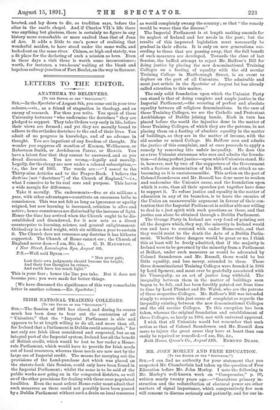IRISH NATIONAL TRAINING COLLEGES.
[TO THE EDITOR OF THE " SpEcrsioa."] -SIR,—The Session of 1891 has closed, and during its course much has been done to bear out the contention of all 4. Unionists," that the "Imperial Parliament is able and appears to be at length willing to do all, and more than all, for Ireland that a Parliament in Dublin could accomplish ; " for not only are Irish ideas considered and respected, but as an integral part of the Imperial system, Ireland has all the benefit of British credit, which would be lost to her under a Home- rule Parliament, which would have to provide for Irish needs out of local resources, whereas these needs are now met by the ilarge use of Imperial credit. The means for carrying out the provisions of the Land-purchase Act which was placed on the statute-book this Session, could only have been found in the Imperial Parliament; whilst the same is to be said of the public works now going on in the congested districts, as well as of the other provisions for dealing with these over-populated localities. Even the most ardent Home-ruler must admit that such measures as these could not possibly have been passed by a Dublin Parliament without such a drain on local resources
as would completely swamp the country ; so that "the remedy would be worse than the disease."
The Imperial Parliament is at length making amends for its neglect of Ireland and her needs in the past; but the results of this improved legislation must necessarily be gradual in their effects. It is only on new generations suc- ceeding to those that are passing away, that the full benefit of such measures are developed, Towards the close of last Session, the baffled attempt to reject Mr. Balfour's Bill for doing justice by placing the new denominational Training Colleges on a footing of equality with the old secular Training College in Marlborough Street, is an event to deplore on the part of all Unionists. The admirable and most just article in the Spectator of August 1st has already called attention to this matter.
The only solid foundation upon which the Unionist Party can stand is that of doing complete and ample justice in the Imperial Parliament, —the securing of perfect and absolute equality between all religious denominations. In the case of these Training Colleges, we see the Catholic and Protestant Archbishops of Dublin joining hands. Each in turn has placed before the world the injustice done in the matter of these Training Colleges, of which they are the patrons, in not placing them on a footing of absolute equality in the matter of buildings, as they are in the matter of income, with the old secular or mixed College. Mr. Balfour sees and admits the justice of this complaint, and at once proceeds to apply a remedy by removing this unfair inequality. He does this as a true Unionist statesman who sees and admits the founda- tion—of doing perfect justice—upon which Unionists stand. He is, however, met by two of the supporters of the Government with a furious denunciation of his Bill, and an attack as un- becoming as it is unstatesmanlike. This action on the part of Colonel Saunderson and Mr. Russell has done more to weaken and undermine the Unionist cause, and the foundation upon which it rests, than all their speeches put together have done to support it. To refuse justice and equality in the matter of education in any of its branches, is to leave the enemies of the Union an unanswerable argument in favour of their con- tention that the Imperial Parliament is neither able nor willing to deal in a just spirit with such questions as these, and that justice can alone be obtained through a Dublin. Parliament.
The Orange Party in Ireland are very fond of pointing out all the dangers which, they say, the minority in Ireland would run and have to contend with under Home-rule, and that they would resist to the death the Acts of a Dublin Parlia- ment. Whether these dangers would be great or no, I think this at least will be freely admitted, that if the majority in Ireland were to be governed by the minority from a Parliament at Belfast, under such measures as would be advocated by Colonel Saunderson and Mr. Russell, there would be but little equality, and less mercy, extended to them. These three denominational Training Colleges were founded in 1884 by Lord Spencer, and must ever be gratefully associated with his Viceroyalty, as an act of justice long withheld. The inequality between them in the matter of buildings soon began to be felt, and has been forcibly pointed out from time to time by Lord Plunket and Dr. Walsh, who are the patrons of these respective Colleges. Mr. Balfour's Bill was intended simply to remove this just cause of complaint as regards the inequality existing between the new denominational Colleges and the old secular Colleges. To this exception has been taken, whereas the original foundation and establishment of these Colleges, so lately as 1884, met with universal approval.
I wish that all Unionists would but remember that such action as that of Colonel Saunderson and Mr. Russell does more to injure the great cause they have at heart than can easily be repaired or remedied.—I am, Sir, &c., Rath House, Queen's Co., August 11th. EDMUND DEASE.


































 Previous page
Previous page